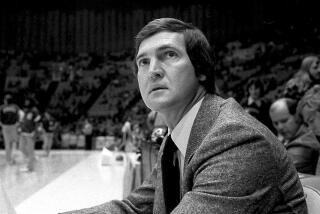APPRECIATIONS : Dottie West’s Country Music Legacy
- Share via
Dottie West, who died in Nashville Wednesday of injuries suffered in an auto accident, opened wide doors in country music.
In the mid-’60s, she was one of the handful of singers, including Loretta Lynn, who helped demonstrate that females could compete on honky-tonk jukeboxes with the men who had previously dominated the field.
After achieving a Top 10 hit on a 1964 duet with Jim Reeves titled “Love Is No Excuse,” West quickly followed up with her own Top 10 hit, “Here Comes My Baby.” She was invited that same year to be a member of the Grand Ole Opry.
Along with such artists as Kenny Rogers and Dolly Parton in the ‘70s and ‘80s, West helped expand the appeal of country music to a wider urban audience.
Though West had a Top 50 pop hit in 1973 titled “Country Sunshine,” the breakthrough in her pop acceptance was on a 1981 duet with Rogers titled “What Are We Doin’ in Love.”
What the pop crowd found was not a classic country singer a la Parton or Emmylou Harris, but a winning performer with a sexy, glittery image, sometimes wearing costumes designed by Bob Mackie--quite a way from the music’s old folksy image. Yet those who knew her best say West--who went through bankruptcy and other career reversals in recent years--never lost her “down-home charm.”
Rogers described West on Wednesday as the quintessential country girl--someone, from a family of 10 children, who enjoyed having relatives and friends over and cooking big dinners for them.
Michael Brokaw, who worked with West in the ‘70s and early ‘80s as her agent and then manager, also stressed West the person. “She never ceased to amaze me--what she would give to other people. When someone’s house burned down, she would have them over, have dinner, say they could live there. I’ll never forget her spirit and personality. One reason that audiences felt so strongly about her was that this woman had heart.”
More to Read
The biggest entertainment stories
Get our big stories about Hollywood, film, television, music, arts, culture and more right in your inbox as soon as they publish.
You may occasionally receive promotional content from the Los Angeles Times.








